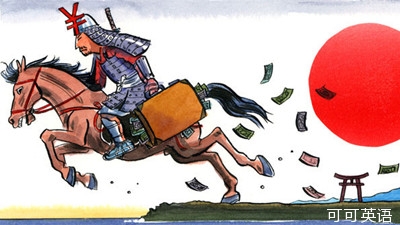商業報道
Japanese firms shop abroad
進軍海外
Armed with a strong yen
以強勢日元攻破海外市場
Why Japan Inc has been going on a foreign spree
為何日本企業轉而血拼海外
MR TICKLE and Mr Bump are leaping into bed with Hello Kitty.
奇先生與妙小姐中的撓癢癢先生和莽撞先生癩蛤蟆想吃天鵝肉,躥上了凱蒂貓的床。
Sanrio, the owner of the bow-adorned feline, said on December 6th that it had acquired the Mr Men franchise from Chorion of Britain.
三麗歐公司是戴蝴蝶結貓的主人,該公司于12月6日說其已從英國購買了奇先生的特許經銷權。
The deal, for an estimated 3 billion,brings the Japanese design and licensing firm 86 playful characters who have delighted toddlers in 30 countries and shifted 100m books.
這次交易估計價值為30億日元使得日本這個設計和經銷公司擁有了86個曾給30個國家幼兒帶去歡樂的幽默好玩的人物。該書在市面上售出上億本。
Corporate Japan is on an overseas shopping spree.
日本的公司在海外瘋狂地進行兼并擴展。
 Japanese firms spent a record $80 billion on some 620 foreign companies in 2011, according to Dealogic, a firm that measures such things, exceeding the previous record of 466 deals worth $75 billion in 2008.
Japanese firms spent a record $80 billion on some 620 foreign companies in 2011, according to Dealogic, a firm that measures such things, exceeding the previous record of 466 deals worth $75 billion in 2008.
據專門衡量公司并購的研究機構迪羅基表示,2011年日本公司耗資800億美元收購了620個左右的外國公司,從而打破了2008年創下的750億美元購得466企業的歷史記錄。
When Japan Inc went shopping abroad in the 1980s, it was a sign of strength.
二十世紀八十年代,日本公司往海外開疆拓土時,那時是國力強盛的標志。
Japanese companies were spreading their wings because they were growing. This time, it is a symptom of weakness.
這次是其國力衰退的征兆。
The past year in Japan has been wretched.
過去的一年對于日本來說是凄凄慘慘的一年。
An earthquake and tsunami in March wrecked factories and disrupted supply chains, creating shortages of all sorts of crucial components. Radiation fears hurt exports.
今年3月發生的地震和海嘯摧毀了工廠使供應鏈癱瘓,導致各種關鍵零部件嚴重短缺。
A strong yen walloped profits.
人們對幅射的擔憂影響了出口。
Floods in Thailand interrupted the distribution of electronics and car parts.
堅挺的日元蠶食了利潤。泰國的洪水中斷了對電子和汽車部件的配送。
Corporate-governance scandals cast a black cloud over blue suits nationwide.
公司、政府丑聞層出不窮,像烏云黑壓壓地籠罩在這個島國上空。
The Japanese population is ageing and shrinking.
日本的人口在老化縮減。
The economy is sluggish. Consumption is lacklustre.
經濟不景氣。消費萎靡不振。
So Japanese firms find it nearly impossible to expand domestically.
故日本公司在國內幾乎找不到可以擴展的地方。
At the same time, thanks to crises elsewhere in the rich world, the yen is extraordinarily strong.
同時,幸虧其他發達國家的經濟危機,日元非常地堅挺。
It has appreciated by 45% against the dollar in the past four years.
在過去的四年中,日元對美元已升值45%。
And having learned thrift during their own banking crisis a decade ago, Japanese firms are flush:
日本從其十年前的銀行危機中學到了節約開支的教訓,日本公司利潤豐厚:
big listed companies are sitting on a cash pile of ¥60 trillion.
大的上市公司坐擁價值60萬億的現金。
With all this buying power and few opportunities at home, it is hardly surprising that Japanese firms are snapping up foreign companies, especially in fast-growing emerging economies.
隨著國內購買力低迷和機會減少,日本到處搶灘海外市場尤其是高速發展的新興經濟體則不足為奇。
Unless we grow we're not able to stay alive simply by staying in Japan,
若國內有市場,我們則仍繼續呆在日本求生存。
explains Tadashi Yanai, the boss of Uniqlo's Fast Retailing, a big clothing firm.
服裝巨頭優衣庫的老板柳井正解釋道。
The time is ripe for foreign deals, he chirps.
他感嘆道向海外進軍的時機成熟了。
The economic crises in America and Europe have pummelled share prices, making companies cheaper to acquire.
美國和歐洲的經濟危機使公司股票嚴重縮水,使得收購公司易于反掌。
Back in the 1980s Japanese firms hunted trophies such as golf courses and film studios.
回顧二十世紀八十年代,日本公司海外擴張的戰利品包括高爾夫球場和電影制片廠。
Now they are taking a more pragmatic approach, buying solid firms in fast-growing markets and filling gaps in their product lines.
現在他們采取更務實的策略,即從高速增長的市場中購買實體工廠以填補其生產線的空白。
For example, Kirin, a big Japanese brewer, is acquiring a majority stake in Schincariol, a Brazilian one, for $2.6 billion.
例如,日本的啤酒制造巨頭麒麟啤酒以26億美元的代價獲得了巴西的Schincariol公司的股份控制權。
The Japanese beer market is flat; Brazil's is growing by 10% a year.
日本的啤酒市場非常平淡;巴西的啤酒以年均10%的速度在增長。
The biggest deal of the year was when Takeda, a Japanese drug firm, bought Nycomed, a Swiss one, for 1 trillion.
今年最大的并購當數日本的醫藥公司Takeda以1萬億日元將瑞士藥廠Nycomed收入旗下。
Almost 40% of Nycomed's sales are in emerging markets.
新興市場占據了Nycomed將近40%的銷售。
Japanese trading houses are hungrily buying energy projects, especially those involving shale gas.
日本商行迫不急待出手能源項目尤其是涉及到頁巖天然氣的項目。
This year they spent $10 billion, up from less than $3 billion in 2010.
今年他們在這些項目上的投資從2010年的不到30億美元上升到100億美元。
The pace of such deals accelerated after Japanese nuclear-power plants were suspended following the nuclear accident at Fukushima in March,
在今年3月福島核事故發生后,日本原子能工廠項目被中止,使得許多日本人擔心國內能源供應。
which made many Japanese worry about their energy supply.
故日本加大了收購海外能源的步伐。
Toshiba spent $1.6 billion on Landis+Gyr, which makes smart electricity meters for homes.
東芝在制造家用智能電表Landis+Gyr身上投資了16億美元。
Sony paid $8.4 billion for control of its cellphone venture, Sony Ericsson, a stake in the record label EMI and other stuff.
索尼花了84億美元以控制手機企業索愛,且獲得了百代唱片公司和其他公司的股份。
This time really is different
這次是真的與往昔不同
In the past, Japanese firms would parachute in bosses from Tokyo to run the show.
在過去,日本公司從東京空降一批高層來接管新兼并的企業,
Many were monocultural and mediocre.
很多高層人員近親繁殖,水平一般。
Now, Japanese firms wisely rely on local talent.
現如今日本公司明智地依賴當地人才。
Many of the new generation of Japanese executives have lived and worked abroad,
許多新一代的高管們具有在國外生活和工作的經驗。
notes Shinsuke Tsunoda, the head of mergers and acquisitions in Japan at Nomura, a Japanese securities house.
值得留意的有野村證券交易所并購的Shinsuke Tsunoda領導。
This means they are more comfortable doing deals with foreigners, and they are better at integrating the foreign firms they buy with their new Japanese owners.
這意味著這些高層人員與外國人打交道更舒服,而且他們能更好地整合所并購的海外企業而非本國企業。
The foreign shopping spree is internationalising Japanese industry by the back door.
搶灘國外市場使日本企業使通過幕后交易達到國際化目的。
Japan Inc is acting like a massive sovereign-wealth fund, placing its money abroad to earn investment income at home.
日本公司就像巨大的主權財富基金,將錢投資于國外為本國獲得投資收入。
When old people retire, they tend to live off their savings.
當老人退休后,他們憑儲蓄度日。
They supply capital to younger, sprightlier, cash-strapped folk, who put it to work and pay dividends or interest to the retirees.
并為年輕有為,朝氣蓬勃且資金拮據的新一代提供資本用于投資。年輕人則支付紅利或利息給退休人員。
That is, roughly speaking, what Asia's ageing archipelago is starting to do.
大致說來,這正是這個日益老齡化的亞洲群島正開始做的事。
 Japanese firms spent a record $80 billion on some 620 foreign companies in 2011, according to Dealogic, a firm that measures such things, exceeding the previous record of 466 deals worth $75 billion in 2008.
Japanese firms spent a record $80 billion on some 620 foreign companies in 2011, according to Dealogic, a firm that measures such things, exceeding the previous record of 466 deals worth $75 billion in 2008.
 Japanese firms spent a record $80 billion on some 620 foreign companies in 2011, according to Dealogic, a firm that measures such things, exceeding the previous record of 466 deals worth $75 billion in 2008.
Japanese firms spent a record $80 billion on some 620 foreign companies in 2011, according to Dealogic, a firm that measures such things, exceeding the previous record of 466 deals worth $75 billion in 2008.